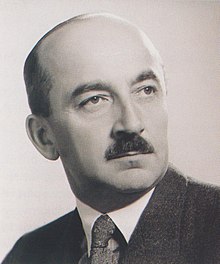Ferenc Nagy
| Ferenc Nagy | |
|---|---|
 |
|
| 1st Prime Minister of the Second Hungarian Republic | |
|
In office 4 February 1946 – 31 May 1947 |
|
| Preceded by | Zoltán Tildy |
| Succeeded by | Lajos Dinnyés |
| Personal details | |
| Born |
8 October 1903 Bisse, Kingdom of Hungary, Austria-Hungary |
| Died | 12 June 1979 (aged 75) Herndon, Virginia, US |
| Nationality | Hungarian |
| Political party | Smallholders Party |
| Children | 5 |
Ferenc Nagy (Hungarian: [ˈfɛrɛnt͡s ˈnɒɟ]; 8 October 1903 – 12 June 1979) was a Hungarian politician of the Smallholders Party. He was a Speaker of the National Assembly of Hungary from 29 November 1945 to 5 February 1946 and a member of the High National Council from 7 December 1945 to 2 February 1946.
Nagy was reported to be of peasant origins.
Later he served as Prime Minister of Hungary from 4 February 1946 to 31 May 1947. He was elected in 1946, in Hungary's first democratic election. As prime minister, he resisted attempts by the Hungarian Communist Party to gain complete control of the government. He refused attempts by the Communists to become a puppet of a Soviet backed police state, but resigned under duress (they had kidnapped his son). He gave up the premiership in return for his son and 300,000 Swiss francs. Subsequently he was granted asylum in the United States.
Nagy documented his life and political career in The Struggle behind the Iron Curtain, published by MacMillan in 1948. In 1959, he was reported to have been the president of Permindex, a trade organization headquartered in Basel, Switzerland
Royalties from his memoirs helped him buy a house with a substantial garden plot in Herndon, Virginia (then an exurb of Washington, D.C.), there to live out his days.
...
Wikipedia
